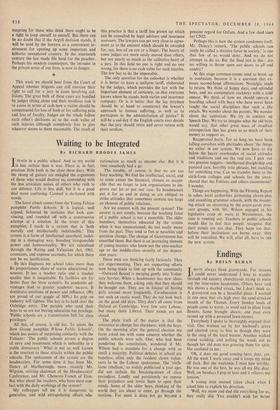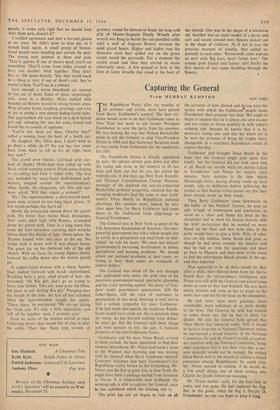Endings
By BRIAN BEHAN I HAVE always liked graveyards. For reasons I could never understand I love to wander through old' country churchyards trying to make out the time-eaten headstones. Others have said this shows a morbid streak, but I don't think so. A graveyard can be a beautiful place. I worked in one once that sits high over the, sand-streaked mouth of the Thames. Every. Sunday loads of people came to water, to weed and to plant fresh flowers. Some brought shears; one man even turned up with a powered lawn-mower.
Everybody I spoke to thoroughly enjoyed their visit. One woman sat by her husband's grave and chatted away to him as though they were in the snug of the local boozer. Another walked round scolding, and pulling the weeds out as though her old man was growing them for spite. She confided in me: 'Oh, it does me good coming here, dear, yes. All the week I work away and it keeps my mind off Jack. But the weekends I miss him terribly. He was one of the best, he was all my life, dear. Well, on Sundays I pop in here and it relieves my tension.'
A young man seemed taken aback when I asked him to explain his devotion.
`Well, my mum and dad did everything for us, they really, did. You couldn't wish for better people; it seems only right that we should look after them now, doesn't it?'
I nodded agreement and shot a hurried glance at my mate. He didn't seem to miss me, so I turned back again. A small group of brown- faced people were standing just outside the gate. The young man pointed at them and said, `They're gipsies. If one of them's dead, you'll see something. They'll come from miles around to bury one another. Stick together. They don't like us.' He spoke bitterly. 'Yes, they could teach us a thing or two; if one of them's sick, they're round to help. You'll see in a minute,' Sure enough a warm beneficent air seemed to rise out of them. Some of them, surprisingly rich, came in a Bentley. More walked with bunches of flowers nursed in strong brown arms. With all came kisses, laughing, greetings, and cries of joy at seeing a new plump bishop-faced baby. One gap-toothed old man dived on a dark-haired girl and, sweeping her into his arms, kissed and kissed her to rounds of applause.
`You're not dead yet then, Charley boy?' called a woman from the back of a beetle car.
He laughed. 'No, Olive dear, I don't want to go there a while, do I? No one has ever come back from there to tell us it's all right, have they now?'
The crowd grew thicker. Car-load after car- load of chunky Mafia-type men rolled up with black-veiled weeping women. From horse-dealing to car-selling had built • a richer tribe. The first car, preceded by waxy-faced skull-domed pall- bearers, stopped outside the superintendent's office. Inside, the clergyman, tall, thin and ner- vous, asked, Will they expect a sermon?'
'No.' The superintendent, a silver-haired hand- some man, stroked on two long black gloves. 'A few words perhaps, but that's all.'
Slowly the procession moved down the gravel path. No fewer than twelve black limousines, their roofs piled high with flowers, scrunched down the gravel path. Then in a long wavy line came the foot mourners, carrying their. wreaths before them like shields of light. Down below, the Thames looped wide and clear to the sea. No bridge held it down now it was almost home. The grave lay on the sheltered side of the old church. With set faces the young diggers slowly lowered the coffin down into the brown gravel pit.
A copper-faced woman with a sharp Apache head pushed forward with hands outstretched. Brushing back a grey, oiled strand of hair, she screamed, `Ah Ria girl, don't go so young to leave your babies. Take me, your poor old Olive, but leave us our darling Ria girl.' Plunging over the mouth of the hole, she had all but vanished when the superintendent caught her gently. 'There, there,' he murmured. 'We are not taking her from you. It's only a little separation; you will all be together soon, I promise you.'
Even so, more of the women started to wail. Gathering closer, they tossed bits of clay in after the coffin. Then they flung long strands of greenery round the bottom to break the long cold grip of Master-Sergeant Death. Wreath after wreath was flung in beside the oak-panelled coffin until a wall of fragrant flowers warmed the solid gravel banks. Higher and higher rose the blossoms until they spilled out on the green carpet round the graveside. For a moment the crowd stood and then they started to move reluctantly away. A few paused to look at the lines of fancy wreaths that stood at the back of the church. One was in the shape of a television set. Another was an exact model of a horse and cart and tossed around were flowers picked out in the shape of cushions. As if not to lose the precious moment of kinship, they called re- peatedly to each other. 'Broweswell, come and see us now with Big Levi, don't forget now.' The sounds grew fainter and fainter until finally the first shovel of clay came thudding through the flowers. •





























 Previous page
Previous page